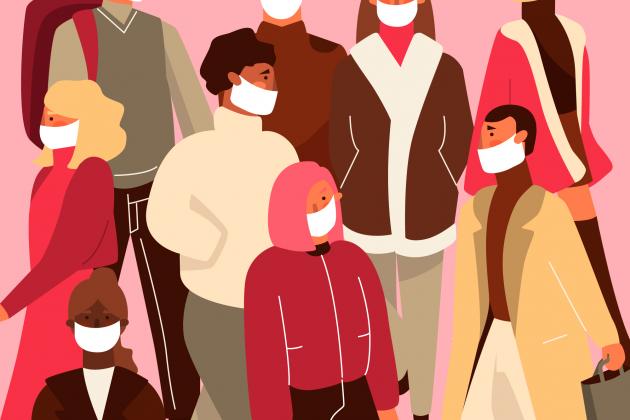
by Action Canada for Sexual Health and Rights
As the world grapples with COVID-19 and an increasing number of countries are being affected by the pandemic, the role of Canada in international assistance remains as important as ever.
In the face of this global health crisis, Canada’s approach, guided by the Feminist International Assistance Policy (FIAP), is crucial in ensuring a feminist and human-rights based response to COVID-19 that recognizes the gendered impacts of the pandemic and the importance of sexual and reproductive health and rights (SRHR) at this time.
Action Canada for Sexual Health and Rights encourages the Government of Canada to ensure an integrated response to the virus that includes SRHR, with a particular focus on the neglected areas of SRHR, including abortion access, comprehensive contraceptive care, SRHR for adolescents and youth, including comprehensive sexuality education, and advocacy for SRHR.
Sexual and reproductive health and rights underpin gender equality and are pivotal to good health. Evidence shows that when women are denied access to contraception, safe abortion and post-abortion care, maternal mortality rates rise. SRHR services are essential health care and must be accessible. A continued focus on the neglected areas of SRHR must also be part of the global response to COVID-19.
In the FIAP, the Government of Canada recognizes the importance of access to SRHR for women and girls in its humanitarian response. In the face of a global health crisis, it is time to action the policy and ensure that the needs of women and girls in the most underfunded and overlooked areas are a priority in the global response.
A feminist approach to the pandemic includes addressing the unique impacts of COVID-19 on marginalized groups, including women, girls, LGBTQI2S+ persons, people living with disabilities, the working poor, those already living in emergency and humanitarian settings, and many others who face discrimination and barriers to resources, healthcare, and social services. In times of crisis, these inequalities are exacerbated and compounded by new and additional hardships such as greater economic instability, increased gender-based violence (GBV), and higher rates of unplanned pregnancies. Further, with women disproportionately represented on the frontlines of the pandemic as health workers and in caregiving role, women have an increased risk of contracting the virus.
Why do the neglected areas of SRHR need to be prioritized in the global response to COVID-19?
- Access to contraception
- The demand for contraceptives does not change during times of crisis. However, mass disruptions to supply chains and the diversion of supplies to the COVID-19 response create new and additional barriers to access. Supply chain disruption applies to various forms of contraceptives including birth control pills, condoms, and devices, as well as access to emergency contraception. It is imperative that these basic and essential commodities be available and accessible throughout the pandemic.
- Without decreased access to contraception, it is expected that unplanned pregnancies will increase in the coming months, putting further strain on health systems and increasing demand for abortion.
- Other ways to increase access to contraception include easing administrative barriers. This includes not requiring a prescription, allowing contraceptives to be prescribed via telemedicine, allowing pharmacists to prescribe contraceptives, and by providing comprehensive cost coverage.
- In addition to contraception, supply chain disruption could have an effect on other SRHR related drugs, including antiretrovirals for those living with HIV, medical abortion pills, and antibiotics and other medications used to treat sexually transmitted infections.
- Safe abortion
- Abortion is an essential and time-sensitive procedure. However, in emergencies, it is often deprioritized, delayed or not offered at all as health systems are stretched thin and supplies and human resources are directed elsewhere.
- Lockdowns, social distancing and increased barriers to travel during the pandemic make it even harder for pregnant people to access abortion. Unfortunately, where safe abortion is not readily accessible, people will turn to unsafe abortion.
- Supply chain disruptions can also affect access to medical abortion (also known as the abortion pill). A safe method to terminate pregnancy that requires minimal travel or exposure to the virus, many advocates and medical professionals are pushing for expanded access to medical abortion (e.g. by removing legal and administrative barrier, allowing its use up to 12 weeks, and allowing prescriptions via telemedicine).
- SRHR for adolescents and youth
- The pandemic has forced the closure of schools in many countries, leaving billions of children and youth without access to education. Learning from past humanitarian crises, these interruptions can lead to increased drop-out rates, which disproportionately affects adolescent girls by furthering gender gaps in education and leading to increased risk of sexual exploitation, early pregnancy, and early and forced marriage. Outside of school, the caregiving burdens on young women and adolescents may increase. They may also lose access to health and hygiene services or products that are often offered through schools.
- The closure of schools also means that young people are being denied life-saving comprehensive sexuality education (CSE). CSE is a key intervention to prevent childhood sexual abuse, intimate partner violence, and sexual violence. When delivered properly, CSE can address persistent stigma, prejudice, and discrimination against the LGBTQI2S+ community and reduce homophobic and transphobic violence. This is critical knowledge that enables children and youth to keep themselves healthy and safe and should be accessible to all, even in times of crisis.
- Advocacy for SRHR
- Communities must be central in the COVID-19 response. Local mobilizers and organizations best know their community’s needs, including the unique needs of women, girls, LGBTQI2S+ persons, and other vulnerable groups. Feminist, women’s rights and youth organizations should be supported and meaningfully included in policymaking at all levels in the response to COVID-19, and in program design, delivery and monitoring.
- Amid government efforts to control movement and limit the spread of the virus, there has been an uptick in surveillance, censorship, and criminalization, putting civil liberties at risk. Human rights defenders drawing attention to these abuses, including health care workers, journalists, and other whistleblowers must be protected.
- Another threat to access to SRHR includes ideological attacks by policymakers using the pandemic to push through laws and restrictions that violate human rights. This includes everything from abortion restrictions to attacks on trans rights.
As we face this unprecedented global health crisis, we urge Canada to maintain its global feminist leadership and commitment to SRHR in its international assistance. This means a continued focus on the most neglected areas of SRHR at a time pf heightened inequality to ensure uninterrupted access to these essential and lifesaving SRHR services.
Additional resources:
- COVID-19: A Gender Lens - Protecting Sexual and Reproductive Health and Rights, and Promoting Gender Equality (UNFPA)
- COVID-19's Gender Implications in Development and Humanitarian Settings (CARE); Full Policy Paper
- How will the coronavirus affect access to safe abortion?
- The COVID-19 Outbreak: Potential Fallout for Sexual and Reproductive Health and Rights
- Sexual and Reproductive Health During the COVID-19 Crisis
Image attribution: Freepik
